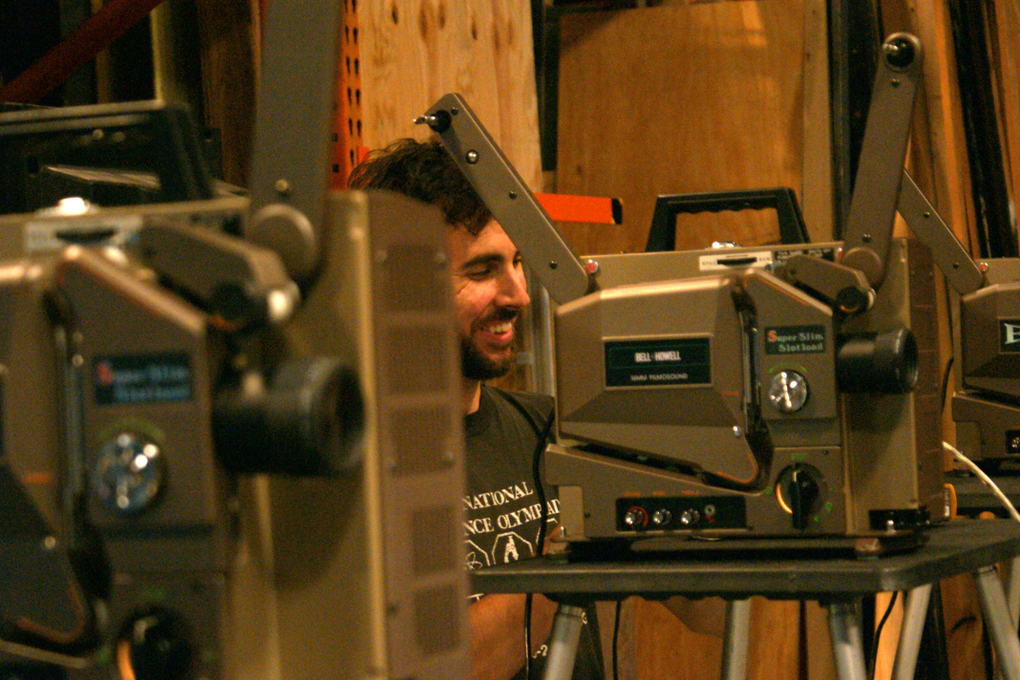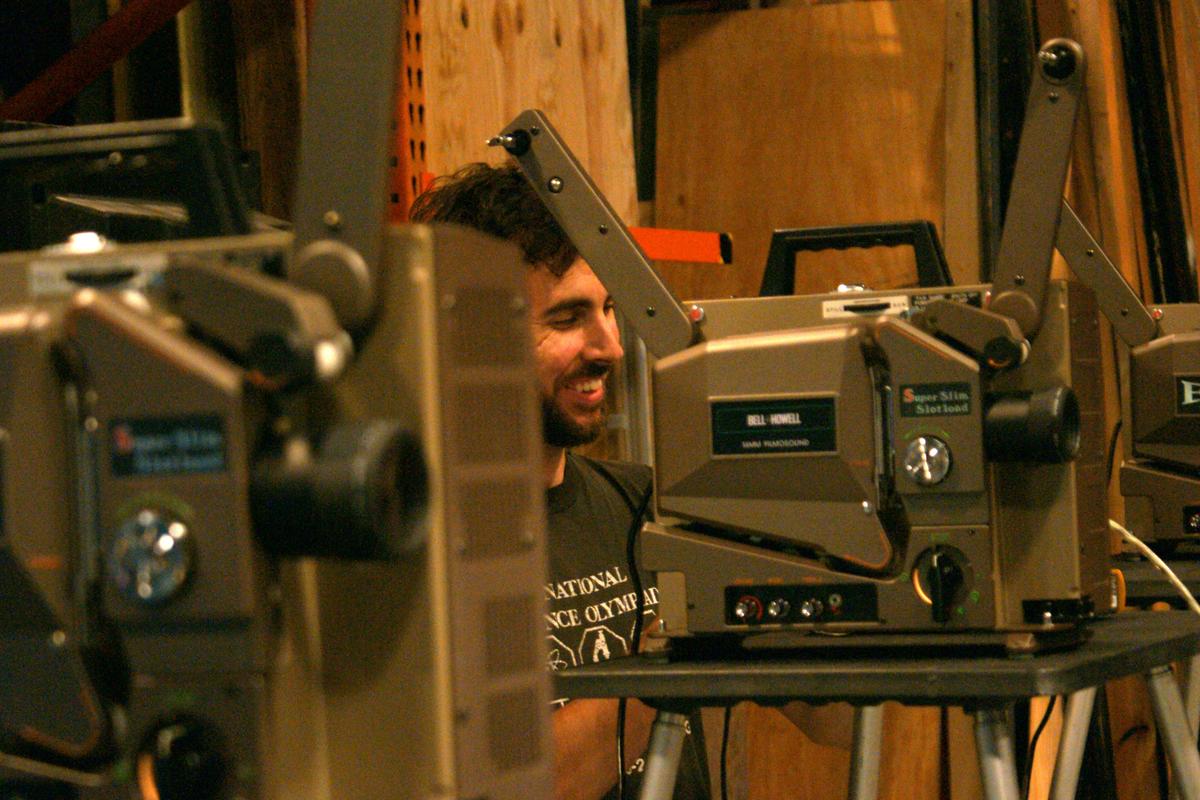Mark Williams (MW): Your programme is called Recycled Cinema, and an LA Weekly promo for one of your shows recently described you as a "filmmaker-philosopher". Could you tell us a little about what you’re recycling, and to what end?
Roger Beebe (RB): That "filmmaker-philosopher" thing actually surprised me a little. I think it might be a mutation of the "filmmaker/curator/professor" that I had in my original press release. So at some level, it’s possibly the end result of a game of telephone. That said, I do have a goal (or several goals) in mind for my recycling that might loosely be called philosophical. (They might also be called ethical or political or aesthetic too.) At one level the recycling refers to media texts, whether those are contemporary mass media (as in most of the video work) or dated 16mm educational and industrial films. With those, I’m generally interested in thinking about the ways we represent our world to ourselves, about the ideologies embedded in these often seemingly “innocent” documents.
At another level, the recycling refers to the gear I actually use in my filmmaking. We’re living in an odd era when someone interested in making 16mm films can get most of the gear s/he would need for free or very cheap. My fleet of 16mm projectors I purchased from the school board for $10 a piece. My splicer cost me $2. The found footage I saved from various dumpsters. I’ve shot on cameras purchased at flea markets for less than $5. There’s a counter-capitalist ethos in this that’s really important to my practice. When we’re being constantly shown the new, bright, shiny thing that we’re supposed to desire next, it’s important to insist on the value of those things that maybe aren’t so bright and shiny anymore. (Plus those older cameras and projectors can still make some gorgeous images—more gorgeous in many ways than the new toys that we’re told to play with now.)
MW: In NZ you're screening in music venues. How will the programme respond to the venues?
RB: I’m planning to show works that connect more with different forms of musicality, whether that’s the hand-made soundtrack of TB TX DANCE (that plays in a phase-shifting two-projector stereo version) or the audience-performed singing that’s part of AAAAA Motion Picture or the rhythmic complexity of the multi-projector array in Money Changes Everything. I’ve also got a “zero-projector film,” which is basically just sound art under another name, and I’ll be integrating that into those shows. From the start I’ve been very influenced by music (avant garde and otherwise), so it’s really a pretty natural fit.
MW: You travel extensively, almost like a band, knocking out 40 date tours across America. What’s the most memorable experience you’ve ever had at a screening of your own work?
RB: This is, of course, an impossible question to answer, but one really wonderful memory is a show I did in Shreveport, Louisiana just a few weeks after Hurricane Katrina destroyed New Orleans. A bunch of refugees from the storm were in the packed house at Minicine (Shreveport’s longstanding microcinema), and there was an incredible warmth in the room that I’ve rarely encountered elsewhere. I had two volunteers from the audience hold up the titles for a film that was still in progress at the time—I just put clear leader in the film, so it projected white light onto them—and in the middle of the show, a woman in the audience leaned forward as I was perched over one of my projectors and gave me a friendly pat on the back. It’ll be hard for me to ever match the energy in that room…

American filmmaker Roger Beebe
MW: You used to run a festival in Florida called FLEX. What do you think makes a good experimental film programme?
RB: I like lots of different kinds of festivals with very different models, but FLEXfest was designed to operate on a modest budget (so that we weren’t constantly fundraising) with work presented in the best possible way (good projection, good sound, etc.) and with a very filmmaker-friendly ethos (free food, drink, and lodgings, trips to local attractions, parties at night, etc.). FLEX also intentionally kept the entry fees low ($10 for domestic entries, free for overseas entrants and alums) in that same spirit of filmmaker friendliness. I’m pretty sure that over the years we did the festival we gave out more money in prizes than we ever took in in entry fees.
MW: You used to run a video store in Florida—maybe you still do? They’ve pretty much died in NZ except for a handful of arthouse stores. Is there anything to lament about the passing of the video store? Am I jumping the gun—perhaps they could survive somehow?
RB: The video store still exists, although I’m no longer involved in running it. It barely keeps its head above water, but I do think that there’s a real need for video stores in an era when it’s already too late to save most of them. Streaming services offer very limited catalogues not based on any aesthetic or film-historical criteria but really just on arbitrary contracts between giant corporations. My store was designed to represent the best of what cinema has been and can be; Netflix (et al.) is designed to provide enough “product” to keep you entertained. I wrote a long essay for Media Fields journal (online) if you want to get my extended rant.
I wonder if enough people have now realised the limitations of Netflix that they’d maybe come back to stores if they sprung back up. Of course, since Apple is now making computers without optical drives, they’re making it that much harder to use physical media...
MW: Finally, if there was one underground film-maker everyone should know about but nobody does it would be…
RB: Well, since most people don’t know ANY experimental filmmakers, there’d be a long list of people I’d want to summon. It’d be fruitless to point to someone like Peter Kubelka, though, since none of his work is online. (Is he known? He should be! He played a big role in the a-g film scenes in both New York and Vienna, and the few films he’s made are all masterpieces.) But if we’re talking about contemporaries, I’ve been surprised that none of my Antipodean hosts have known the work of Jesse McLean, which does seem to play at most of the big North American and European festivals. If she’s unknown here, I’d definitely encourage everyone to dive in, starting here.
